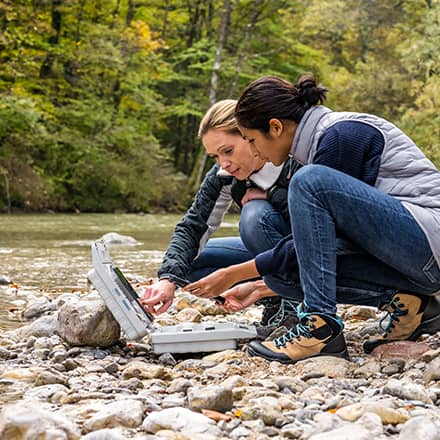
Learn about the living world as a Biology major
A Biology degree can provide the educational foundation for a wide range of professional fields, including science and healthcare. The Bachelor of Science in Biology program at Southern New Hampshire University combines hands-on laboratory and field work with coursework investigating the diversity and biology of plants, animals, and microbes - developing both practical skills and theoretical learning to help lay the groundwork for a successful career.
The overall goal of the Biology program at SNHU is to foster awareness, appreciation, and understanding of biology as a diverse and dynamic field, and to prepare students to enter a wide range of career paths, certification programs, or graduate programs that utilize their unique skills and knowledge.
See Yourself Succeed as a Biology Major
The Biology program at SNHU may serve as the backbone for many health-related programs, and the University is proud to offer a program that prepares students to pursue a wide range of pathways following graduation. Many graduates may choose to pursue additional educational opportunities and certificate programs, intending to enter fields such as health and teaching that will require additional qualifications; however, others may seek more immediate employment opportunities. Eligible students who choose the health sciences concentration may take advantage of our partnership with the Massachusetts College of Pharmacy and Health Sciences (MCPHS) to pursue a nursing or PharmD degree.
As a private, nonprofit university, SNHU has one mission - to help you see yourself succeed. The benefits of majoring in biology at SNHU include:
- Supportive community. Join the SNHU campus community of students who are closely connected with faculty and staff dedicated to your success
- Affordability. It’s our mission to make higher education more accessible. That’s why, SNHU is one of the most affordable private, nonprofit universities in New Hampshire.
- Accessible faculty. Learn from highly credentialed faculty who are experts in their fields and interact with you in the classroom, dining hall, fitness center, and more
- Opportunity. Tap into our nationwide network of alumni and strong connections with employers for internship and career opportunities
- Campus experience. Enjoy more than 50 student clubs, champion Division II athletics and fun events on our 300-acre campus in Manchester, N.H.
Concentrations
Health Sciences
The field of healthcare is continuously evolving, and skilled professionals are always in demand. The health sciences concentration streamlines the courses required of graduate and professional healthcare programs, providing a vital foundation in science and human health and development. Students can expect to complete this program with a better understanding of the human body through multiple perspectives.
Courses may include:
- Neuroscience
- Human Health and the Environment
- Introduction to Bioinformatics
- Lifespan Development
Through a partnership with the Massachusetts College of Pharmacy and Health Sciences (MCPHS), eligible students in the health sciences concentration may transfer to MCPHS to pursue a nursing or PharmD degree.
PharmD
- 4+3 | Complete your BS at SNHU and transfer into MCPHS’s accelerated PharmD program.
- 3+3 | Complete 3 years of study at SNHU and transfer into MCPHS’s accelerated PharmD program.
Upon successful completion of the first year of coursework at MCPHS, students will receive a Bachelor of Science in Biology from SNHU. - 4+4 | Complete your degree at SNHU and transfer into MCPHS’s standard PharmD program.
- 3+4 | Complete 3 years of study at SNHU and transfer into MCPHS’s standard PharmD program.
Upon successful completion of the first year of coursework at MCPHS, students will receive a Bachelor of Science in Biology from SNHU.
Nursing
- 4+3 | Complete your BS at SNHU and transfer into MCPHS’s accelerated nursing program.
*Note: Admission criteria must be met to be eligible for the partnership programs, and space is limited.
Careers & Outcomes
The Biology program will teach you to think critically about the living world and our role within it. You will have a thorough understanding of both practical and theoretical biology, as well as additional topics selected by you through your elective courses.
Although additional licensing, certification or education is required for entry into many health-related fields - such as nursing, physical therapy, and teaching - the Biology program at SNHU is an excellent starting point, and provides students with strong foundational knowledge required to pursue a variety of biology-related careers. Whether your ultimate goal is to launch your career immediately, seek additional certifications, or enter graduate school, the Biology program at SNHU will prepare you to face your next challenge.
Curriculum
We've designed the Biology course of study to reflect the many different career options available to Biology majors. We pride ourselves on offering students the ability to tailor their education to their interests and career goals. Below, you can see some of the many course options available to you through the Biology program.
Courses To Prepare You For Your Life & Career
SNHU's bachelor's in biology program includes:
- General education courses
- Degree-specific courses
General Education Program
SNHU's required general education program, known as The Commons, aims to guide you toward success in not only your academic career, but your personal and professional life too.
Throughout the curriculum, you'll gain some of the most in-demand skills in today's workplace, including:
- Research and information analysis
- Diverse audience communication
- Critical thinking and ethical problem solving
- Leadership, emotional intelligence and collaboration
This expertise will prove practical, transferable and invaluable as you grow in your career and contribute positively to society.
Beyond foundational skill development, the general education program also provides the benefit of allowing you to explore a wide range of fields outside of your intended major.
| View Full Curriculum in the Catalog |
|---|
| BS in Biology |
| Courses May Include | ||
|---|---|---|
| BS in Biology Campus | ||
| BIO 120 | General Biology I | General biology course that includes mammalian cell structure and function, cellular reproduction and physiology, and Mendelian genetics. Laboratory exercises (BIO 120L) to follow lecture topics. |
| BIO 120L | General Biology I Lab | Laboratory course to follow topics presented in BIO 120. |
| BIO 121 | General Biology II | This course builds on information presented in BIO 120. Topics include: principles and history of evolutionary theory, taxonomy, and systematic examination of the five Kingdoms of organisms: Bacteria, Protista, Fungi, Plantae, and Animalia. |
| BIO 121L | General Biology II Lab | Laboratory course to follow topics presented in BIO 121. This course gives students hands-on experience with laboratory techniques, and in-depth investigation and comparison of organisms. Students will observe the structure and function of cells, tissues, and organs. They will also examine evolutionary connections between the five Kingdoms of organisms. |
| BIO 200 | Bioethics | This course is a survey course in bioethics. Real case studies and readings will be used to familiarize students with current issues. Topics include abortion, life and death issues such as brain death and assisted suicide, experimentation with humans and animals, and public health issues. Students will present case studies for discussion, participate in debates, and learn to justify their own ethical positions related to these issues. This course is useful for anyone who intends to work in health care, laboratory settings, teaching, or biotechnology. Students will have a greater awareness for these important issues, and they will learn how to how to discuss these sometimes sensitive topics with others. |
| BIO 210 | Introduction to Anatomy and Physiology | Discussion/comparison of the principles of mammalian form and function. Includes molecular and cellular mechanisms of major processes (such as muscle contraction, neural transmission, and signal transduction) and examines the structure and function of the 11 organ systems of the human body. Laboratory exercises (BIO-210L) to follow lecture topics. |
| BIO 210L | Anatomy and Physiology Lab | Anatomy and Physiology Lab is a counterpart to BIO-210, in which students will examine tissues, bones, muscles and the major organ systems. The laboratory is hands-on and will include use of microscopes, visual representation in models, videos and online dissection. |
| BIO 270 | Genetics | This course covers the basic principles of eukaryotic cell genetics. Emphasis is placed on the molecular basis of heredity, DNA and chromosomal structure, patterns of Mendelian and non-Mendelian inheritance, gene expression, and biotechnological applications. |
| BIO 280L | The Microbial World Lab | Laboratory exercises to follow topics presented in BIO 280. Students will focus on developing skills in the laboratory, including microscopy, staining and isolation of bacterial species, identification of microbes, and use of chemical and physical agents to control microbial growth. |
| BIO 280 | The Microbial World | This course exposes students to the fundamentals of microbiology. It opens with a survey of the microbial world and a discussion of the interactions between microbes and host. Students will evaluate microbial diseases of humans, and the environmental and economic impact of microorganisms. The course provides a background in basic and applied microbiology with an emphasis on the role microorganisms play in human health. |
| CHM 120 | General Chemistry I | First semester of a one-year sequence covering the basic principles of chemistry. Topics include atomic and molecular theory and structure, the chemical and physical behavior of gases, liquids, solids, and solutions; chemical bonding; chemical equations and thermochemistry. |
| CHM 120L | General Chemistry I Lab | This course will introduce laboratory techniques that will be used to gain fundamental knowledge of chemical systems associated with the subject matter of CHM 120 - College Chemistry I |
| CHM 121 | General Chemistry II | Second semester of a one-year sequence covering the basic principles of chemistry. Topics include chemical equilibria; acid-base chemistry; electrochemistry; kinetics and nuclear chemistry. |
| CHM 121L | General Chemistry II Lab | This course will introduce laboratory techniques that will be used to gain fundamental knowledge of chemical systems around the subject matter of CHM 121 - College Chemistry II. |
| CHM 309 | Biological Chemistry | This course is designed to provide students with a broad introduction to biochemistry and the major concepts of the chemical processes of living organisms. The major themes of the course include: the chemistry of water, foundations of biological and organic chemistry, the structure and function of the three major classes of biomolecules (proteins, carbohydrates and lipids), and enzyme kinetics. |
| PHY 101 | Principles of Physics | Principles of Physics is an algebra based course that explores the major topics in physics, such as motion and forces, gravity and projectiles, energy and work, thermodynamics, vibrations and waves, electricity and magnetism, solids and fluids, light and optics, and atomic and nuclear physics. |
| Total Credits: 120 | ||

Campus Undergraduate Tuition
Our Manchester campus aims to keep tuition and related costs low for our students so that you can pursue your degree and your goals.
University Accreditation

Related Articles

What is Information Security? Why It’s Important, Job Outlook and More

How to Become a Game Developer


